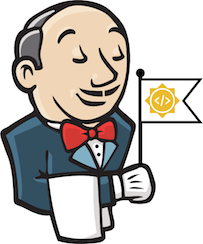Google Summer of Code 2021 call for Project Ideas and Mentors
| Google Summer of Code (GSoC) is a program where students are paid a stipend by Google to work on a free open source project. Students work on the project for three months (June to August). Prior to the coding phase, there is a month of community bonding, to welcome students to the Jenkins community and acquaint them with the projects processes for communication and collaboration. Mentors are actively involved with students from March when students start to work on and submit their applications. (see the timeline) |

We are looking for project ideas and mentors to participate in GSoC 2021. GSoC project ideas are coding projects that university or college students can accomplish in about three months. The coding projects can be new features, plugins, test frameworks, infrastructure, etc. Anyone can submit a project idea, but of course we like it even better if you offer to mentor your project idea.
We accept new project ideas at any time, However, project ideas need to be finalised before February 19th, 2021 at 7pm UTC, which is the deadline for the Jenkins organization to apply to the GSoC program. Please send us your project ideas before the beginning of February so they can get a proper review by the GSoC committee and by the community.
How to submit a project idea
Create a pull-request with your idea in a .adoc file
in the project ideas.
It is not necessary to submit a Google Doc, but it will still work if you want to do that.
See the instructions on submitting ideas which include an .adoc template and some examples.
Current list of ideas
We currently have a list of project ideas for students to browse. Note that this list is subject to change.
What does mentoring involve?
Potential mentors are invited to read the information for mentors. Note that being a GSoC mentor does not require expert knowledge of Jenkins. Mentors do not work alone. We make sure that every project has at least two mentors. GSoC org admins will help to find technical advisers, so you can study together with your students.
Mentoring takes about 5 to 8 hours of work per week (more at the start, less at the end). Mentors provide guidance, coaching, and sometimes a bit of cheerleading. They review student proposals, pull-requests and the students presentations at the evaluation phase. They fill in the Google provided evaluation report form at the end of coding periods.
What do you get in exchange?
In return of mentoring, a student works on your project full time for three months. Think about the projects that you’ve always wanted to do but never had the time…
Mentoring is also an opportunity to improve your management and people skills, while giving back to the community.
There will be a Google Mentor Summit which takes place every year. In 2020, the Mentor Summit was virtual, but in previous years the summit has taken place in person.
See this post about the 2019 in person Mentor Summit.
GSoC is a fantastic program and the Jenkins project is happy to participate in GSoC again in 2021!
For any question, you can find the GSoC Org Admins, mentors and participants on the GSoC SIG Gitter chat.